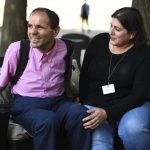Due in part to misinformation linking vaccinations to autism, there has been an outbreak of measles in the Pacific Northwest in areas with large populations of parents who refuse to have their children inoculated. Since the beginning of 2019, at least 35 people have been infected, and one child has been hospitalized. Public health officials reportedly estimate the virus could take months to contain.
A study published in the Journal of the American Medical Association found that children spending two to three hours daily viewing screens such as iPads, smartphones and televisions were more likely to exhibit delays in reaching three-year-old and five-year-old developmental milestones. The study tracked almost 2,500 children from birth. Researchers wrote that, to their knowledge, this was the first study to find a “stable association” between screen time and developmental delays.
The Autism and Developmental Disabilities Monitoring Network, which tracks the prevalence of autism among four- and eight-year-olds, will expand to track 16-year-olds. Four of the network sites will return to individuals whose information they gathered as eight-year-olds to learn about their behavioral traits, cognitive test scores and educational services received as teenagers. The Centers for Disease Control and Prevention, which fund the network, expect this information to lead to improvements in identifying autism, providing appropriate services and planning for the transition to adulthood.
Bangor, Maine resident John Hiatt, who has autism, was elected to the Bangor school committee and to the position of county treasurer last November. A member of the Maine Republican Party’s State Committee, Hiatt says he was open about his autism during the campaign. His narrow victory in the county treasurer’s race enables him to advise the county commissioners and finance director, which he says fits well with his skills, while his position on the school committee allows him to help young children, one of his passions.
In the face of sustained advocacy from disability rights groups, the U.S. Food and Drug Administration says it plans to ban a shock device that the Massachusetts Judge Rotenberg Education Center uses to influence the behavior of children and adults with disabilities. Rotenberg administrators and some students’ family members contend the device, a backpack carrying batteries wired to students’ skin that administer a shock when triggered, is the only way to control aggressive or self-injurious behavior.





